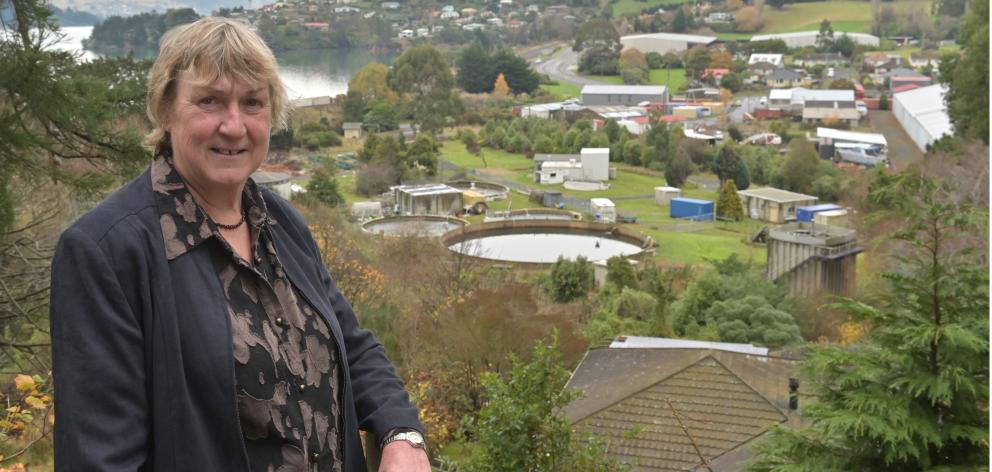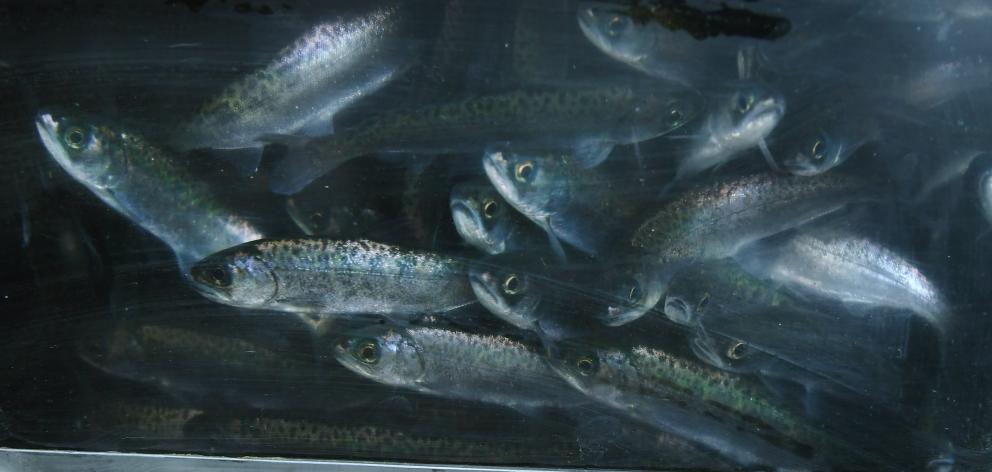Former volunteers turn whistleblowers after fish die in droves at a Dunedin salmon hatchery. Those in charge fire back and renew allegations of sabotage. Police find no evidence and file no charges. Regulators wade in and find issues with record-keeping. George Block investigates a community asset riven with recrimination.
In the depths of a hot Dunedin summer in January last year, police received a report of what was claimed to be a vindictive act of vandalism at a salmon hatchery in Sawyers Bay.
Hundreds of fish died at the facility, operated by a trust set up to raise the salmon for release into the wild to supply the city's well-known fishery.
Dunedin Community Salmon Trust chairman Steve Bennett said at the time it was the latest in several such attacks and police launched an investigation.
Later that year, dozens more fish died.
Mr Bennett again said in the media someone had intentionally powered off aerators to kill the fish.

They say he killed the fish because he was unhappy with how the hatchery was being run.
Police have never made an arrest nor laid charges in the case, and found no evidence to support the allegations of vandalism.
In a police file obtained under the Official Information Act, an officer said at the end of the investigation there was "no evidence to suggest the nominated suspect has offended against the hatchery in any way," and asked for the matter to be filed.
A specialist scene of the crime officer searched for evidence, including fingerprints, but found nothing.
Following the January deaths, they also checked motion-sensored trail cameras activated by movement and noted nothing had been recorded around the time of the alleged attack.
Police eventually concluded there was also no evidence to suggest the former volunteer was responsible for any of the mass deaths.
"I now have my doubts that any offence occurred," wrote an officer in June last year before asking for the case to be filed.
Notes in the heavily-redacted police file state the aerators had previously stopped working due to wear and tear, overheating and power failure, causing numerous salmon to die.
The local man accused of the vandalism, who was earlier trespassed from the facility, disagrees with how the hatchery is now operated, but he strongly denies sabotaging the facility he helped clean and maintain for more than a decade.
Instead, the long-serving volunteer says the January deaths happened because hot weather at the time caused hoses to loosen in their fittings and fall out, starving the salmon of oxygen.
He was trespassed from the hatchery between those deaths and the May incident.

It was a mistake he had made but quickly rectified during his happy days helping look after the hatchery, he said.
The man is supported by several other former volunteers, fronted by Roseneath woman Raewynne Pedofski, who believe the deaths were due to negligence rather than vandalism.
They are also unhappy with what they see as the exclusion of volunteers and members of the public from the hatchery, which in past years has hosted open days for the community, where children could catch a fish from the ponds.
Questions have also been raised by the former volunteers about the trust straying from its mission set out in the deed, namely to raise salmon for release into Otago Harbour and other waterways, train staff and volunteers to operate and maintain the hatchery and provide support and assistance for similar organisations.
Meanwhile, the New Zealand Salmon Anglers Association Otago has stopped accepting fish for release and was unhappy with the condition of salmon earlier supplied by the hatchery.
Instead, this month they released smolt (young salmon) sourced from Canterbury into Dunedin's Lindsay Creek and the Water of Leith.
Two former volunteers and an ex-treasurer turned whistleblowers and wrote to the Ministry for Primary Industries (MPI) with a wide range of concerns about how the hatchery is run, in letters they supplied to the ODT.
Ms Pedofski is a self-employed tax and business consultant, and former community board member, who enjoyed fishing with her intellectually disabled son.
She was asked by her friend to take over as treasurer for the trust in October 2016 and gladly accepted, she said in a letter to MPI late last year.
But she soon became concerned by the actions of trustee and hatchery manager Roger Bartlett.
"It became clear to me that Roger Bartlett's attitude in his overall care of the fish is `let's just let nature take its course,' with no interventions," she wrote.
Ms Pedofski said a long-serving volunteer was told to stop turning off taps from a creek to the hatchery's tanks during periods of heavy rain to minimise mud getting into the system until the muddy water subsided.
The volunteer reluctantly agreed to stop turning off the taps. As a result, one weekend morning in winter 2017, following heavy rain, mud entered the system and about 6000 smolt died, she alleged.

But during the release, Mr Bartlett took out 1000 fish to be brood stock the following year, as 2018 was to be the first year the hatchery extracted eggs from their own mature salmon to be kept on site.
Upon learning of the plans for 2018 Ms Pedofski said she became concerned the hatchery would be unable to accommodate the predicted numbers, while she also believed the hatchery's model was becoming unsustainable financially.
Her words fell on deaf ears and she resigned in September 2017, she wrote, but she continued to hold grave concerns for the welfare of the salmon.
In April this year, MPI received another letter raising serious concerns about the hatchery, this time from a retired Dunedin couple who used to volunteer at the facility.
They supplied the letter to the Otago Daily Times on the condition their names were not used.
Their pressing concern was the salmon's welfare. The situation had worsened in recent years, they said.
"The demise of the hatchery has sadly coincided with the decision to raise their own brood stock along with the lack of a preventive maintenance programme."
The couple also raised concerns the trust was straying from its original purpose of raising salmon for release into Otago Harbour so people could enjoy a recreational salmon fishery in a city harbour, which was a rarity.
They alleged trust board members were taking fish for their own use, paid trust staff were given salmon for consumption and salmon were being sold for consumption, and not just being sold to the Salmon Anglers Association for release - all of which was confirmed by trust chairman Steve Bennett in recent interviews with the Otago Daily Times.
MPI staff met with Ms Pedofski in December last year after officers received her letter raising concerns about the welfare of the fish and inadequate maintenance.
Compliance investigations and services manager Gary Orr said an animal welfare inspector visited the hatchery and examined the tanks and general welfare of the fish.
They also looked into the hatchery's record-keeping requirements regarding movements of fish on and off the farm, including sales, and discovered a range of issues, Mr Orr said.
"In essence, the hatchery's records were not up to the standard specified in the hatchery's Fresh Water Farm Licence.

Then in April, the other letter arrived and MPI again took action.
Mr Orr said the Ministry's Animal Welfare, Fisheries Compliance and Aquaculture Permitting teams had worked together to draft conditions for future licences to ensure "optimal animal welfare conditions".
MPI staff would soon meet members of the hatchery's board of trustees to address the latest complaints, he said.
When pressed on whether or not MPI found substance to the concerns raised about the welfare of the fish and general maintenance, Mr Orr said there were "no minimum standards that are set for the rearing of fish, and therefore there is no legal requirement for a minimum standard to be achieved".
"We were concerned about ensuring the viability of the fish in that, acknowledging there are mortalities in that type of operation, we just wanted to make sure it was run as well as possible.
"There's a difference between whether there is any culpability in the mortality, or whether it is just something that needs to be tidied up by working with the operator.
"We're working with them to make sure the operation is run in the best possible fashion in the interests of the fish."
In an update supplied yesterday morning, a Ministry spokeswoman said MPI officers had now carried out three sepereate inspections since the original complaint, one of which engaged the services of an "independent fish welfare and aquaculture expert."
"To date, no welfare or food safety issues have been observed at any of the inspections."
However, MPI continued to investigate possible non-compliance with the hatchery's licence conditions, she said.
She would not comment further due to the ongoing investigation.
Trust chairman Mr Bennett and hatchery manager Mr Bartlett strongly defended the way the hatchery was run when interviewed separately by the ODT this month.
Mr Bennett said the hatchery was not having issues with mortality and had conducted its own release of salmon earlier this year.
Asked about the reason the Salmon Anglers Association had bought smolt from elsewhere for release this month, he said the association had now provided a contract for supply which mandates a range of conditions.
"They have had the same people that are complaining to you in their ear, so now they've provided us with a contract to supply, that outlines a whole lot of things we have to do to satisfy their curiosity, for want of a better word.
"We're not in a position to allow our books to be opened for audit all the time for them, as they want."
The anglers wanted the hatchery to raise the fish for an extra six to seven months, which the hatchery disagreed with.
It is understood the association was unhappy with the condition of fish supplied in recent years, and happier with the recent 20,000 smolt acquired from a hatchery in Canterbury.
He acknowledged the trust was selling fish to Licenced Fish Receivers, as allowed under its licence, but was not prepared to say who the buyers were.
In his view, selling some un-needed fish was in the long-term interest of the hatchery.
"It creates a little bit of income from a fish that we would ... be throwing on the barbecue ourselves because it's no good for us."
Claims trustees were taking fish for their own use and giving salmon to some sponsors were also correct, he said.
"I took a fish last year for Christmas ... name a farmer that doesn't have a side of mutton in the freezer.
"They're our fish, we can do whatever we want with them."
He blamed more stringent health and safety requirements for the recent lack of open days.
Manager Mr Bartlett, when asked for comment about the claims of a lack of cleaning and general maintenance, said: "Well, I wouldn't publish that if I was you."
He again maintained the long-serving volunteer was responsible for the deaths in January and May last year, and claimed the hatchery had sufficient evidence to trespass him.
(Mr Bennett claimed to have photos of the volunteer entering the hatchery after he had been told he was not welcome, but did not supply them to the ODT).
When asked about claims by others that his previous ventures into fish farming had failed, he acknowledged they had closed because they were not commercially viable.
"It depends how you define failed.
"Most of them were experimental, and were closed down because they weren't going to prove to be commercially viable.
"You don't want to read too much into that."












